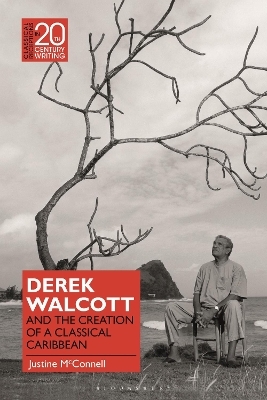
Derek Walcott and the Creation of a Classical Caribbean
Seiten
2024
Bloomsbury Academic (Verlag)
978-1-350-34314-6 (ISBN)
Bloomsbury Academic (Verlag)
978-1-350-34314-6 (ISBN)
- Noch nicht erschienen (ca. Dezember 2024)
- Versandkostenfrei
- Auch auf Rechnung
- Artikel merken
Throughout his career, Derek Walcott turned to the literature and cultures of ancient Greece and Rome. His book-length poem recasting the epics of Homer, Virgil and Dante in St Lucia is best-known in this regard, yet Omeros is only the pinnacle of a lengthy and lively dialogue that Walcott developed between the ancient Mediterranean and the modern Caribbean. Derek Walcott and the Creation of a Classical Caribbean explores how, in developing that discourse between ancient and modern, between Europe and the Caribbean, Walcott refuted the suggestion that to engage with literature from elsewhere was to lack originality; instead, he asserted a place for Caribbean art in a global, transhistorical canon.
Drawing on Walcott’s own theoretical concerns, this book explores his engagement with Graeco-Roman antiquity from three key perspectives. Firstly, that a perception of time as linear must be coupled with an understanding of it as simultaneous, thereby doing away with the oppressive power of history and confirming the ‘New World’ on a par with the ‘Old’. Secondly, that syncretism lies at the heart of Caribbean life and art, with influences from Africa, Asia, and Europe constituting key parts of Caribbean identity alongside its indigenous cultures. Thirdly, that Caribbean literature creates the world anew without erasing the past.
With these three postcolonial conceptions at the heart of his engagement with ancient Greece and Rome, Walcott revealed the reasons why classical reception has been a rich facet of Caribbean artistry.
Drawing on Walcott’s own theoretical concerns, this book explores his engagement with Graeco-Roman antiquity from three key perspectives. Firstly, that a perception of time as linear must be coupled with an understanding of it as simultaneous, thereby doing away with the oppressive power of history and confirming the ‘New World’ on a par with the ‘Old’. Secondly, that syncretism lies at the heart of Caribbean life and art, with influences from Africa, Asia, and Europe constituting key parts of Caribbean identity alongside its indigenous cultures. Thirdly, that Caribbean literature creates the world anew without erasing the past.
With these three postcolonial conceptions at the heart of his engagement with ancient Greece and Rome, Walcott revealed the reasons why classical reception has been a rich facet of Caribbean artistry.
Justine McConnell is Reader in Comparative Literature and Classical Reception at King’s College London, UK. She is author of Black Odysseys: The Homeric Odyssey in the African Diaspora since 1939 (2013) and, with Fiona Macintosh, Performing Epic or Telling Tales (2020), and has co-edited four books on the reception of Graeco-Roman antiquity.
Acknowledgements
Introduction: The Homeric Shadow
Chapter 1: Time
Chapter 2: Syncretism
Chapter 3: Re-Creation
Epilogue
Notes
Bibliography
Index
| Erscheint lt. Verlag | 26.12.2024 |
|---|---|
| Reihe/Serie | Classical Receptions in Twentieth-Century Writing |
| Zusatzinfo | 2 bw illus |
| Verlagsort | London |
| Sprache | englisch |
| Maße | 156 x 234 mm |
| Themenwelt | Literatur ► Lyrik / Dramatik ► Lyrik / Gedichte |
| Geisteswissenschaften ► Sprach- / Literaturwissenschaft ► Anglistik / Amerikanistik | |
| Geisteswissenschaften ► Sprach- / Literaturwissenschaft ► Literaturwissenschaft | |
| ISBN-10 | 1-350-34314-5 / 1350343145 |
| ISBN-13 | 978-1-350-34314-6 / 9781350343146 |
| Zustand | Neuware |
| Haben Sie eine Frage zum Produkt? |
Mehr entdecken
aus dem Bereich
aus dem Bereich
Deutsche Gedichte aus zwölf Jahrhunderten
Buch | Hardcover (2023)
C.H.Beck (Verlag)
CHF 41,90
Text, Übersetzung, Melodien, Kommentar
Buch | Softcover (2024)
De Gruyter (Verlag)
CHF 34,90


